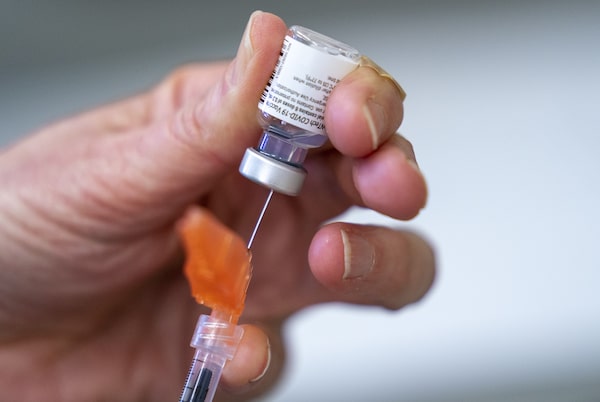
A syringe is loaded with COVID-19 vaccine at a vaccination clinic run by Vancouver Coastal Health in Richmond, B.C., on April 10, 2021.JONATHAN HAYWARD/The Canadian Press
British Columbia is starting a two-week walk-in immunization blitz to make first doses of the COVID-19 vaccine more easily available to the fifth of eligible teens and adults yet to get jabbed.
B.C. Health Minister Adrian Dix and Bonnie Henry, the Provincial Health Officer, said the new push will see staff fanning out at a raft of community events, “vax vans” and other mobile clinics to offer a first dose to any of the 906,772 eligible people in the province who have not yet received a shot. As well, next Wednesday, all vaccine clinics in the province will reserve 20,000 doses for anyone walking in to get a first or second dose without needing an appointment.
“There’s no magic number, but as high as we can possibly get,” Dr. Henry said when asked about the percentage of the population she would like vaccinated before a new school year starts in September. (B.C. is near the national average of roughly 80 per cent of all teens and adults with at least one dose.)
Canada’s travel restrictions for vaccinated and unvaccinated people, explained
Canada vaccine tracker: How many COVID-19 doses have been administered so far?
When do the last COVID-19 restrictions lift in my province? A guide to the rules across Canada
She said there are a variety of reasons why so many people have yet to get the vaccine, with some telling the province the process is too inconvenient and others saying they still have questions about the science behind the vaccines. But as much as 5 per cent of B.C.’s population is dead set against getting vaccinated for ideological reasons, Dr. Henry said, citing internal surveys done by the province.
“They tend to be very organized and very vocal, especially on social media, and this is the time for us to say we can answer your questions, and we can address some of the misinformation and sometimes the disinformation that is out there, and to help support you in being confident and getting yourself protected as well,” she said of those who are beyond hesitant to get immunized.
Mr. Dix and Dr. Henry would not say whether more punitive measures, such as vaccine passports for everyday life, which they have both previously opposed, could be brought in if this current push does not succeed. However, Dr. Henry said she fully supports private business owners that want to bar any customers from entering their properties without proving they have been vaccinated.
“If I was running a nightclub I’d want to make sure that my staff are protected, and yes, we absolutely can say, ‘To come in here you have to be immunized,’ and that gives people the level of comfort that they’re in a safer environment,” she told reporters. “It is still the same places that we’ve always known that are most at risk – so these are indoor, crowded environments where there’s poor ventilation.”
Dr. Henry said recent clusters of cases have centred around unvaccinated people coming together at weddings, funerals and nightclubs. The virus is now spreading in communities with lower vaccination rates, she added.
The Fraser Health Authority, to the east and south of Vancouver, has the most eligible people (315,748) in the province without a single dose, which is just 18.4 per cent of the teens and adults living under its jurisdiction. But the two of the province’s five regional health authorities with by far the lowest rates of vaccination lie outside Vancouver Island and B.C.’s South Coast, according to a slide from the presentation Tuesday. The Northern Health Authority has just under a third of the people in its jurisdiction without at least one dose and the Interior Health Authority has 26 per cent of its eligible population (199,159 people) unvaccinated, according to the presentation.
Penny Ballem, a long-time civil servant and medical doctor leading B.C.’s mass immunization effort, said at Tuesday’s briefing that the current campaign will focus on taking the time to visit more remote communities in these two health authorities.
Over the weekend, cases continued to rise in the Interior of the province, which encompasses Kelowna and Kamloops, has a population of nearly 800,000 and is overseen by one of B.C.’s five regional authorities. On Tuesday, the province announced that 95 of the 150 new cases recorded over the past 24 hours were located within the Interior Health region.
The vast majority (70 per cent) of the new cases in the Interior since society reopened substantially on Canada Day are among those who are unvaccinated. The Interior Health Authority has also said that most of these cases are in adults between 20 and 39 years old.
We have a weekly Western Canada newsletter written by our B.C. and Alberta bureau chiefs, providing a comprehensive package of the news you need to know about the region and its place in the issues facing Canada. Sign up today.
 Mike Hager
Mike Hager